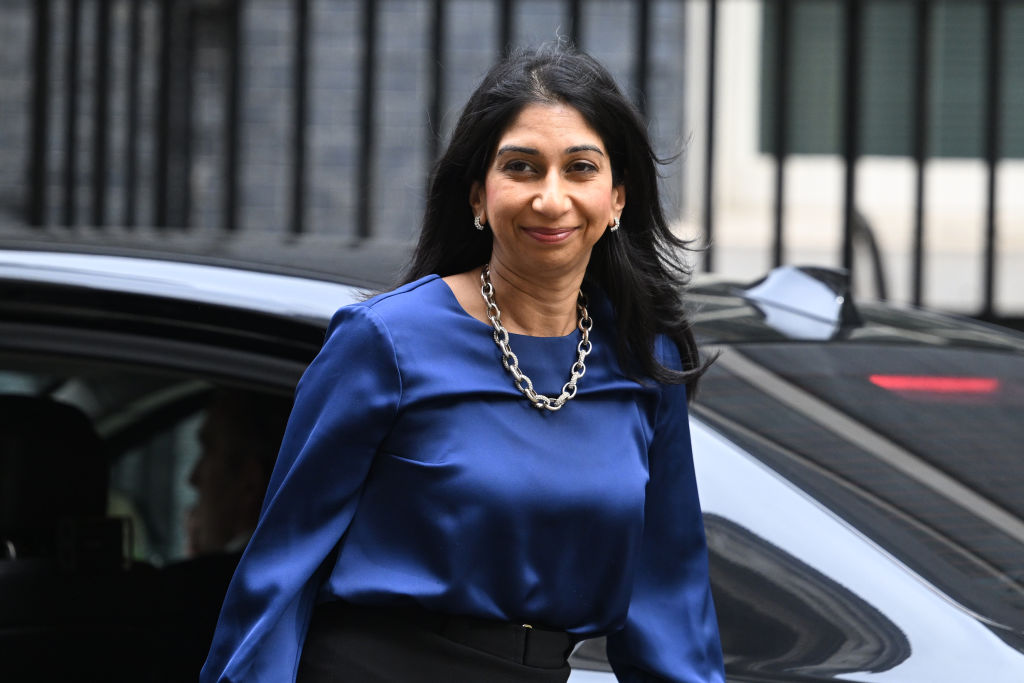There can be few sins in politics graver than giving Suella Braverman a point. Yet that is exactly what the Home Secretary has in her Times op-ed when she writes:
Unfortunately, there is a perception that senior police officers play favourites when it comes to protesters. During Covid, why was it that lockdown objectors were given no quarter by public order police yet Black Lives Matter demonstrators were enabled, allowed to break rules and even greeted with officers taking the knee?
She’s not wrong, is she? Some progressives are arguing that she is because, they contend, Boris Johnson ‘essentially authorised’ the BLM protests when he said in an 8 June 2020 speech: ‘[T]o all those who have chosen to protest peacefully and who have insisted on social distancing – I say, yes of course I hear you, and I understand.’ That can read as an authorisation if you really want it to, but you might struggle to square it with the next sentence.
This stressed that ‘we are in a time of national trial’ against ‘a deadly plague’ and that ‘[a]fter such sacrifice, we cannot now let it get out of control’, not least when ‘it is BAME communities, tragically, that have paid a disproportionate price’. The Prime Minister, in his ‘authorisation’ of protests, then stated: ‘So no, I will not support those who flout the rules on social distancing, for the obvious reason that we risk a new infection at a critical time and just as we have made huge progress.’
It wouldn’t matter if Johnson had ‘authorised’ the protests. The regulations were what they were and the police were duty-bound to uphold them, whatever the Prime Minister said. (There is something perfectly adorable about the notion that officers were doing textual analysis of Boris Johnson’s speeches before deciding whether to nick folk.) Besides, you can’t have it both ways. You can’t chide Braverman for interfering in operational policing decisions when she denounces a demonstration but fall back on Johnson’s authority when you think he sanctioned one.
This double standard reflects larger problems in progressive thinking and strengthens Braverman’s argument. The murder of George Floyd was met with public disgust around the world but it was also accompanied by moral panic and dubious political theatrics. Progressives who had loudly endorsed lockdowns and demanded zero tolerance of anti-lockdown protests were themselves now gathering to protest the actions of Derek Chauvin, systemic racism, ‘white privilege’ and any other cause you cared to tag on.
There were attempts to justify the double standard, none of them convincing but few quite as nakedly partisan as the open letter signed by 1,288 public health academics and practitioners which said the handling of BLM demonstrations ‘must be wholly different from the response to white protestors resisting stay-at-home orders’. The letter recommended: ‘Do not disband protests under the guise of maintaining public health for Covid-19 restrictions.’
This double standard was always going to come back to bite those institutions and professions that endorsed or amplified it. If academics want to understand why their research and analysis is becoming less trusted, they should look to this episode as well as the many other degradations and politicisations of scholarship in the name of activism. If you keep shouting about how everything you do is a political act, don’t be surprised when others start taking you at your word. Ditto clinicians. When a not insignificant number of your colleagues draw on their medical authority to declare that viral infections should be controlled or allowed to transmit based on personal political preferences, and face no rebuke or censure from you or your professional bodies, you must expect that the public standing of clinical advice will be diminished. The same goes for the police and their enforcement of the law.
One of the core flaws of progressivism is its enthralment to the moment
One of the core flaws of progressivism is its enthralment to the moment. History as viewed by the progressive is a succession of injustices too urgent for established rules and processes. Something must be done, it must be done now, and anyone who urges caution or restraint is indifferent to, if not complicit in, the current evil. There is almost no norm, no convention, no ethic that the progressive won’t abandon in his righteous impatience: democracy, science, the rule of law, the presumption of innocence, empiricism or individual liberty.
This does not mean the progressive is a situationalist. The situationalist knows he’s a realist, making ethical judgements based on a pragmatic reading of any situation, aware that the means he justifies in one scenario would lead to objectionable ends in another. The progressive, on the other hand, thinks and speaks in moral absolutes but everywhere he looks he sees exceptions to them. He has no trouble justifying this contradiction to himself because he typically perceives matters that concern him in catastrophic terms and because he is confident in his superior intellect, empathy and moral judgement. His principles are binding on others, but not him. This is why the supreme statement of progressive ethics is: ‘It’s okay when we do it’.
Too many institutions have abandoned or undermined the neutrality they once jealously guarded and they have done so out of deference to progressive political fashions. Not coincidentally, those very fashions are what shape the thinking of the diversity, inclusion and equity bureaucracies that hold a great deal of sway in these institutions. Progressives may rage against Suella Braverman but procedural liberals must admit, even through gritted teeth, that her point about differential policing has some merit. This is what happens when you decide the moment is too urgent and your ethical faculties too advanced to be detained by the processes and protections of liberalism.







Comments